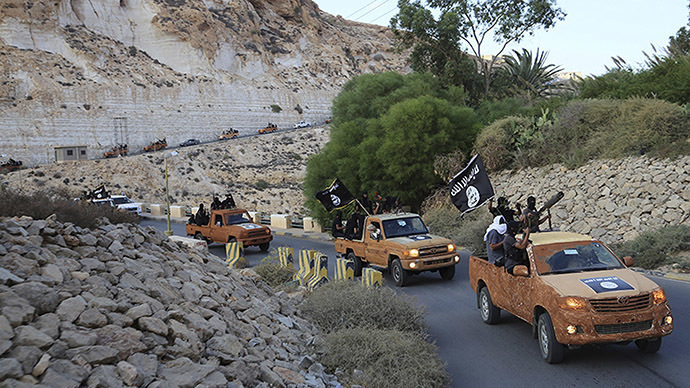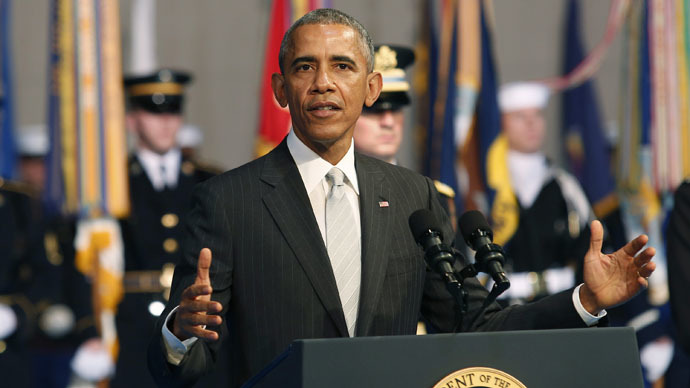Obama asks for ‘3yrs, no territorial limits’ formal war authority to target ISIS

US President Barack Obama has asked the Republican-led Congress for formal authorization for use of military force against jihadist group Islamic State and associated forces in order to "show the world we are united in our resolve to counter the threat."
Obama’s proposal, sent to Capitol Hill on Wednesday this week, calls for a three-year authorization to combat militants, with no specific geographic limitations applied to US forces and “flexibility” regarding the number of ground troops involved.
"The resolution we submitted today does not call for the deployment of US ground combat forces to Iraq or Syria," Pres. Obama told the nation during a televised address from the White House later in the day. "It is not the authorization of another ground war, like Afghanistan or Iraq. The 2,600 american troops in Iraq today largely serve on bases and, yes, the face the risks that come with service in any dangerous environment, but they do not have a combat mission."
The authorization targets Islamic State (IS, also known as ISIS or ISIL) and "associated persons or forces," or those who fight on behalf or with the group, as well as "any closely-related successor entity in hostilities against the United States or its coalition partners."
The plan would repeal the 2002 authorization of force in Iraq originally granted to the George W. Bush administration, but it would not alter the 2001 authorization of military force (AUMF) targeting Al-Qaeda, passed days after the September 11, 2001 attacks. Obama did tell Congress that the ultimately goal, though, was to ultimately drop the 2001 AUMF as well.

The plan bans "enduring offensive combat operations," a term designed to balance opponents of ground troops with those who believe the option should remain open to the president. The draft does not authorize drawn-out, large-scale ground force operations such as those in Iraq in Afghanistan, though ground troops could be used for hostage operations, the White House said.
"The authorization I propose would provide the flexibility to conduct ground combat operations in other more limited circumstances, such as rescue operations involving US or coalition personnel or the use of special operations forces to take military action against ISIL leadership," Obama wrote to lawmakers.
"It would also authorize the use of US forces in situations where ground combat operations are not expected or intended, such as intelligence collection and sharing, missions to enable kinetic strikes or the provision of operational planning and other forms of advice and assistance to partner forces."
Republican US House Speaker John Boehner quickly criticized the proposal, questioning the limits of Obama’s plan.
“If we’re going to authorize the use of military force, the president should have all the tools necessary to win the fight that we’re in,” Boehner said Wednesday, according to Bloomberg.
The president “wants to dismantle and destroy ISIS. I haven’t seen the strategy yet that I think will accomplish that,” Boehner added.
'We are united in our resolve'
Obama’s three-page draft resolution was sent Congress along with a brief letter outlining Islamic State’s offenses and why the White House believes the group "poses a threat to the people and stability of Iraq, Syria and the broader Middle East and to US national security."
"It threatens American personnel and facilities located in the region and is responsible for the deaths of U.S. citizens James Foley, Steven Sotloff, Abdul-Rahman Peter Kassig, and Kayla Mueller," he said, recalling American hostages who have allegedly died at Islamic State's hands.
"If left unchecked, ISIL will pose a threat beyond the Middle East, including to the United States homeland."
Since August, Obama has used Bush-era AUMF resolutions to justify US-led coalition airstrikes against IS in Iraq – and in Syria, since September. More than 2,700 US military troops were also sent to assist and train Iraqi forces.
This rationale has rankled some in Congress, which has traditional power under the US system to grant official war authority. When Republicans took complete control of Congress in the November elections, President Obama said he would request formal authorization for the use of military force.
Sen. Bob Corker, chair of the Senate Foreign Relations Committee, said he would quickly organize "rigorous hearings" on the war plan.
"Voting to authorize the use of military force is one of the most important actions Congress can take, and while there will be differences, it is my hope that we will fulfill our constitutional responsibility, and in a bipartisan way, pass an authorization that allows us to confront this serious threat," Corker said, AP reported.
White House press secretary Josh Earnest said the plan would provide for special operations missions, including raids that target ISIS leaders.
"It's impossible to envision every scenario where ground combat troops might be necessary," Earnest told AP.
"The president believes this sort of strikes the right balance of enforcing what he has indicated is our policy, while preserving the ability to make some adjustments as necessary.”
Making its case for expanded authority, the draft resolution listed grievances held against Islamic State’s "depraved, violent, and oppressive ideology," including its vast territorial holdings in Iraq and Syria amassed after the group gained strength during the Syrian civil war. The resolution also pointed to the group’s recruiting efforts as well as its violence against more moderate Muslims, other religions and women.
"I can think of no better way for the Congress to join me in supporting our nation's security than by enacting this legislation, which would show the world we are united in our resolve to counter the threat posed by ISIL," Obama wrote.
US Secretary of State John Kerry echoed Obama, saying bipartisan support for the resolution would be a clear signal of Washington’s cohesiveness in its targeting of Islamic State.
"The world needs to hear that the United States speaks with one voice in the fight against ISIL," he said, according to Reuters.
Earnest called the resolution – which was shared privately with lawmakers of both parties before its unveiling – a "starting point for conversations to take place." He added that it was designed to allow the next US president and Congress to make adjustments in military strategy based on developments in the next few years.
"The language in here should not be construed as a belief by the president that we'll have defeated and ultimately destroyed ISIL in three years," Earnest said.
He said that the resolution’s limits on ground troops were added to assuage Iraqi leaders and members of the US-Arab coalition currently targeting IS. The lack of geographic barriers outlined in the plan, he said, will allow US forces more flexibility to pursue its goals.
"We wouldn't want to leave [Islamic State] with the impression that they could go somewhere else to get a safe haven," he said.











